Herbalism
7 Surprising Benefits of Herbalism
Ongoing research reveals the astonishing advantages of herbalism, from natural pain relief to radiant skin and hair, and much more waiting to be uncovered.
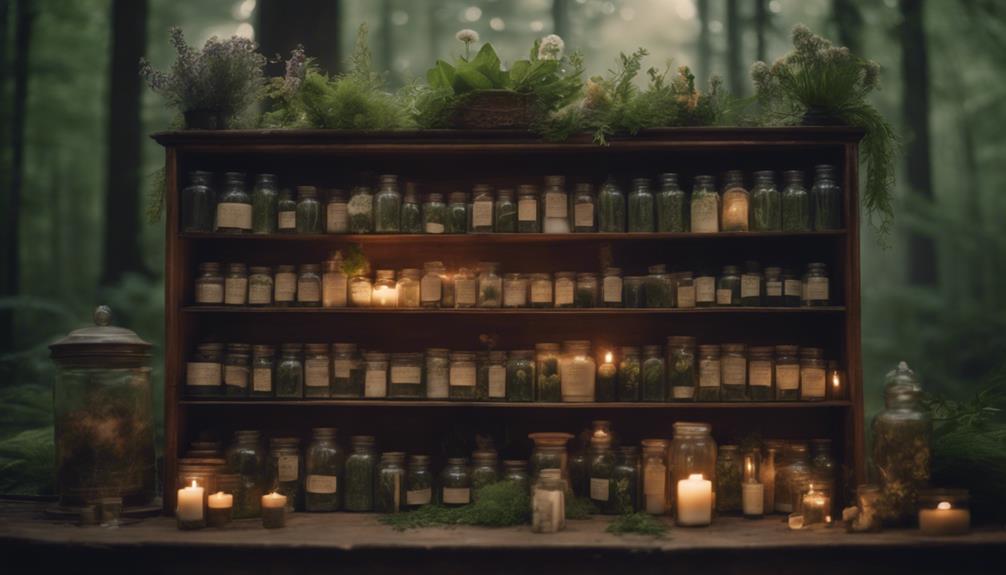
We've long known that herbalism offers an array of benefits, but did you know that its advantages extend far beyond just reducing the risk of chronic diseases? For instance, herbalism provides natural pain relief alternatives, boosts mental clarity and focus, and promotes healthy skin and hair. It also supports immune system function, lowers stress and anxiety levels, and enhances digestive health naturally. With a surprising 80% of the global population relying on herbal remedies as a primary form of medicine, there's more to explore in the world of herbalism – and uncovering its many benefits will only continue to surprise us.
Key Takeaways
• Herbalism strengthens the immune system, balances hormones, and targets root causes of chronic diseases for long-term health and disease prevention.
• Natural pain relief alternatives with anti-inflammatory properties, such as arnica and St. John's Wort, manage various types of pain gently and holistically.
• Herbalism improves mental clarity and focus with herbs like ginkgo biloba and bacopa monnieri, enhancing concentration levels and cognitive function.
• Herbal remedies provide natural skincare and haircare alternatives, stimulating hair growth, improving scalp health, and nourishing skin to reduce signs of aging.
• Adaptogenic herbs in herbalism, such as ashwagandha, promote relaxation, reduce anxiety, and combat stress, supporting overall well-being.
Reduces Risk of Chronic Diseases
By incorporating herbalism into our daily routine, we can greatly decrease our risk of developing chronic diseases. This is because many herbs contain potent antioxidants and anti-inflammatory properties that can help prevent chronic diseases like heart disease, diabetes, and cancer.
By consuming herbal remedies, we can strengthen our immune system, improve digestion, and balance our hormones, reducing the likelihood of developing chronic conditions. Herbal medicine often targets the root causes of chronic diseases, addressing underlying imbalances in the body to promote long-term health and disease prevention.
By utilizing herbalism to support our health, we can potentially reduce the need for pharmaceutical interventions and lower our risk of developing chronic diseases. With herbalism, we can take a proactive approach to our health, focusing on prevention rather than treatment.
Natural Pain Relief Alternatives

We're fortunate to have herbalism, which offers a range of natural pain relief alternatives that sidestep the strong side effects commonly associated with prescription medications.
Many of us have experienced the debilitating effects of chronic pain, and it's reassuring to know that herbalism provides a safe and effective way to manage it. Herbs like ginger and turmeric, with their anti-inflammatory properties, can help alleviate pain.
Remedies like arnica and St. John's Wort have been shown to be effective in managing various types of pain, including muscle aches and nerve pain.
The beauty of herbal treatments for pain relief lies in their gentle approach, which can be used as part of a holistic approach to managing chronic pain.
By incorporating herbalism into our wellness routine, we can access safe and effective options for pain management without the risks of dependency or adverse reactions.
This natural approach to pain relief is a game-changer, offering a welcome alternative to conventional medications.
Boosts Mental Clarity and Focus

As we explore the benefits of herbalism, we're excited to discover how certain herbs can improve our mental clarity and focus.
We've found that herbal remedies can do wonders for our concentration levels, allowing us to stay focused and mentally sharp.
Improved Concentration Levels
We've all experienced those frustrating moments when our minds wander, making it impossible to focus, but incorporating herbal remedies into our daily routine can greatly enhance our concentration levels.
Herbal medicines, such as ginkgo biloba and bacopa monnieri, have been shown to improve cognitive function and memory, allowing us to stay on track and maintain our attention.
Adaptogenic herbs like rhodiola rosea and ashwagandha can reduce stress and enhance mental clarity, making it easier to concentrate.
Moreover, herbal teas like green tea and peppermint can naturally boost alertness and concentration levels.
By incorporating medicinal herbs like gotu kola and lion's mane into our routine, we can support brain health and enhance focus.
Additionally, herbal supplements like panax ginseng and holy basil have been linked to increased mental performance and clarity.
Enhanced Cognitive Function
Frequently, herbal remedies have been shown to have a profound impact on our cognitive function, greatly boosting mental clarity and focus.
We've discovered that certain herbs can play a significant role in enhancing our cognitive function, leading to improved mental performance and reduced mental fatigue. For instance, herbs like ginkgo biloba and bacopa monnieri have been proven to enhance cognitive function, while adaptogenic herbs like ashwagandha and rhodiola rosea help our bodies adapt to stress, supporting cognitive health.
Moreover, herbal teas like green tea and peppermint tea contain antioxidants and compounds that can improve brain function, memory, and concentration. Some herbs, such as gotu kola and lion's mane mushroom, even possess neuroprotective properties, promoting brain health and potentially reducing the risk of cognitive decline.
Promotes Healthy Skin and Hair

We often find that herbal remedies can work wonders for our skin and hair, providing a natural alternative to harsh chemical-based beauty products. When it comes to skin irritations, herbal remedies like lavender, chamomile, and aloe vera can provide soothing relief. These herbs have anti-inflammatory properties that can calm irritated skin, reducing redness and inflammation. Additionally, they can promote a healthy complexion by nourishing and hydrating the skin, reducing signs of aging.
Furthermore, herbs like rosemary and peppermint can stimulate hair growth and improve scalp health. These herbs can combat issues like dandruff, itchiness, and flakiness, leaving our hair looking healthy and vibrant.
By incorporating herbs into our beauty products, we can provide our skin and hair with the nourishment they need to thrive. This natural and sustainable approach to skincare can effectively combat acne, eczema, and other skin issues, all while avoiding harsh chemicals.
Supports Immune System Function

By incorporating herbal remedies into our daily routine, we can give our immune system a much-needed boost, helping our bodies to fight off infections and illnesses more effectively. One of the most effective ways to do this is by using herbal remedies that have been proven to support immune system function.
| Herbal Remedy | Immune System Benefit |
|---|---|
| Echinacea | Increases white blood cell activity |
| Astragalus Root | Helps the body fight off infections and illnesses |
| Ashwagandha and Reishi | Regulates immune response and reduces inflammation |
| Garlic and Turmeric | Enhances immune function by supporting natural defense mechanisms |
Herbal teas like ginger and echinacea can provide antioxidants and anti-inflammatory compounds to support immune health. Additionally, adaptogenic herbs like ashwagandha and reishi can help regulate the immune response and reduce inflammation. By incorporating these herbal remedies into our daily routine, we can give our immune system the support it needs to function at its best.
Lowers Stress and Anxiety Levels

As we explore the surprising benefits of herbalism, we're now going to examine how herbal remedies can help us cope with stress and anxiety.
We've all experienced those overwhelming feelings of unease, but fortunately, nature has provided us with a range of calming herbs that can soothe our nervous systems.
From reducing cortisol levels to promoting relaxation, we'll discover how these natural wonders can bring balance back to our minds and bodies.
Calming Effects on Mind
When it comes to calming our minds and reducing stress and anxiety levels, herbal remedies have proven to be a natural and effective solution. We've found that certain herbs have a profound impact on our mental well-being, offering a sense of calm and tranquility in today's fast-paced world.
Here are just a few examples of the calming effects of herbalism:
- Lavender and chamomile: These herbs have been shown to reduce anxiety and promote relaxation, making them perfect for a good night's sleep.
- Lemon balm and passionflower: Studies have found that these herbs can lower cortisol levels, the stress hormone, helping us feel more at ease.
- Herbal teas like peppermint and valerian root: These teas have been used for centuries to promote relaxation and reduce anxiety, making them a great addition to our daily routines.
Soothing Nervous System
In addition to incorporating herbal remedies that soothe our nervous system to reduce stress and anxiety levels, we can also explore other methods for promoting a sense of calm and tranquility in our daily lives.
Herbal teas, such as valerian root and skullcap, have been shown to promote relaxation and reduce feelings of anxiety. These herbal teas can be consumed daily to maintain a sense of calm and reduce stress levels.
Additionally, adaptogenic herbs like ashwagandha and holy basil can help combat stress and support overall well-being. Herbs like lavender and passionflower have a calming effect on the nervous system, which can be especially beneficial for those who struggle with anxiety.
Furthermore, herbal supplements like kava kava and L-theanine offer natural ways to soothe the nervous system and promote a sense of calm. By incorporating these herbal remedies into our daily routine, we can effectively lower our stress and anxiety levels, leading to a more balanced and peaceful life.
Enhances Digestive Health Naturally

By incorporating herbal remedies into our daily routine, we can effectively alleviate common digestive issues and promote a healthier gut. As we navigate the world of herbalism, we discover that certain herbs can soothe stomach discomfort, reduce inflammation, and even support liver function.
Here are three ways herbalism enhances our digestive health:
- Soothing Digestive Discomfort:
Herbs like chamomile and licorice can calm stomach discomfort, reducing symptoms of indigestion and bloating.
- Supporting Liver Function:
Herbs like dandelion root and milk thistle aid in the digestion and absorption of nutrients, promoting a healthier liver.
- Calming Inflammation:
Herbal teas like ginger tea and chamomile tea can reduce inflammation in the digestive system, promoting a healthier gut.
Frequently Asked Questions
What Are the Benefits of Herbalism?
As we explore the world of natural remedies, we often wonder what benefits herbalism has to offer.
We've found that herbalism provides a gentler approach to health, with fewer side effects compared to prescription meds. It's also more accessible and affordable, making it a cost-effective option.
What Is an Interesting Fact About Herbal Medicine?
We find it ironic that many people overlook the fact that a significant number of modern pharmaceuticals are actually derived from plants and herbs.
In fact, did you know that around 25% of prescription medications contain ingredients sourced from nature?
This surprising connection highlights the importance of herbal medicine in modern healthcare.
It's fascinating to see how ancient remedies continue to influence modern medicine.
What Is the Most Powerful Herb?
We consider ashwagandha the most potent herb due to its remarkable adaptogenic properties. It's been used for centuries in traditional Ayurvedic medicine to promote vitality and longevity.
Studies have shown that ashwagandha reduces cortisol levels, improves stress resilience, and enhances overall well-being. Rich in antioxidants and anti-inflammatory compounds, it supports cognitive function, immune health, and hormonal balance.
Its potent bioactive compounds make it a versatile herb for various health benefits, earning its reputation as one of the most powerful herbs in herbalism.
What Are the Scientific Benefits of Herbs?
We've explored the incredible benefits of herbs, and the scientific backing is impressive.
Garlic, for instance, reduces blood pressure and prevents artery hardening.
Ginger eases pain, lowers cholesterol, and alleviates motion sickness.
Lavender relieves anxiety, improves sleep quality, and lowers blood pressure.
Thyme is rich in antioxidants, supports respiratory health, and aids immunity.
Turmeric's anti-inflammatory properties improve brain function and flavor dishes.
Conclusion
As we wrap up our exploration of herbalism's surprising benefits, let's not forget that Mother Nature has been doling out free healthcare for centuries – and we're just now catching on.
It's almost as if our ancestors knew a thing or two about staying healthy without breaking the bank (or relying on Big Pharma). Herbalism isn't a trendy new fad, but a timeless, evidence-based approach to wellness that's been hiding in plain sight.
It's high time we gave our grandmothers' remedies the respect they deserve.
Herbalism
Where to Get Herbalism for Beginners
Taking the first step into the world of herbalism, discover the best resources for beginners, from online courses to local classes and expert guidance.

We're starting our herbalism journey by exploring various resources that cater to beginners. We can enroll in online courses like the Master Herbalist program or Making Herbal course, which offer flexible learning experiences, valuable resources, and lifetime access to course material. Local classes and communities, such as those found at community centers or botanical gardens, provide hands-on experience and personalized guidance. We can also access online resources, like The Herbal Academy, which offers courses, videos, and guidance on sustainable herb choices and herbal safety. As we venture into the world of herbalism, we'll uncover more tools and knowledge to support our growth.
Key Takeaways
• Enroll in online courses like the Master Herbalist program or Making Herbal course for flexible and detailed learning experiences.
• Explore recommended books like 'Rosemary Gladstar's Medicinal Herbs' and 'The Modern Herbal Dispensatory' for self-education in herbalism.
• Attend local classes at community centers, botanical gardens, or herbal stores for hands-on experience and personalized guidance.
• Utilize online resources like The Herbal Academy for step-by-step guidance, practical tips, and hands-on lessons on herbalism for beginners.
• Join online forums, Facebook groups, and social media platforms to connect with herbalism communities and network with other beginners.
Getting Started With Herbalism
To kick off our herbalism journey, let's begin by selecting a dozen safe and sustainable herbs that align with our personal health and wellness goals. For beginners, it's crucial to choose herbs that are gentle, non-invasive, and easy to work with.
We should consider herbs that are readily available, affordable, and easy to source. We'll focus on herbs that are gentle on our systems, yet effective in promoting overall wellness. By selecting sustainable herbs, we're ensuring that our herbalism practice is environmentally friendly and responsible.
We'll explore herbs that can be easily integrated into our daily lives, such as herbal teas, tinctures, and topical applications. We'll also consider recommended books for self-education, providing us with a solid foundation in herbalism.
Best Online Herbalism Courses

We're taking our herbalism education to the next level by enrolling in online courses that offer a detailed and all-encompassing learning experience. These courses provide flexibility, allowing us to learn at our own pace, and cover a range of topics from basic herbal actions to making herbal preparations. We gain access to valuable resources like handouts, charts, and ebooks, which enhance our learning experience. Plus, with lifetime access, we can continuously learn and reference the material as needed.
The School of Natural Healing, for instance, offers a thorough Master Herbalist program that explores the world of medicinal herbs and custom remedies. We can explore over 65 medicinal herbs and learn how to create effective herbal remedies.
Making Herbal, another popular online course, provides in-depth knowledge on herbalism, covering topics like herbal medicine making, herbal therapeutics, and herbal pharmacy. These online courses are perfect for beginners, offering a solid foundation in herbalism and paving the way for a deeper understanding of this ancient practice.
Herbalism Books for Beginners

We've curated a list of essential herbalism books that serve as a thorough foundation for beginners, providing practical guidance and insights into the world of herbal remedies. These books are perfect for those just starting to explore the world of herbs and herbal medicine.
| Book Title | Author |
|---|---|
| Rosemary Gladstar's Medicinal Herbs: A Beginner's Guide | Rosemary Gladstar |
| The Herbal Medicine-Maker's Handbook: A Home Manual | James Green |
| The Modern Herbal Dispensatory: A Medicine-Making Guide | Thomas Easley and Steven Horne |
| Alchemy of Herbs: Transform Everyday Ingredients into Foods and Remedies That Heal | Rosalee de la Forêt |
| The Complete Book of Herbs: A Practical Guide to Growing and Using Herbs | Lesley Bremness |
These books offer a thorough guide to herbalism, covering topics such as herb cultivation, herbal remedies, and medicine-making. They provide a solid foundation for beginners looking to explore the world of herbal medicine. With these books, you'll gain a deeper understanding of herbs and how to use them to promote health and wellness. Whether you're interested in growing your own herbs or creating herbal remedies, these books are an excellent starting point for your herbalism journey.
Local Herbalism Classes Near Me

To take our herbalism journey to the next level, let's explore local herbalism classes near us, which offer hands-on experience and personalized guidance from experienced herbalists. We can start by checking with local community centers, botanical gardens, or herbal stores for beginner herbalism courses. These classes provide a great opportunity to learn from experienced herbalists and get hands-on practice.
We can also look for herbal workshops or classes at local universities, colleges, or holistic health centers. Additionally, reaching out to local herbalists or herbalist organizations can provide valuable information on beginner herbalism courses or workshops. Online platforms like Meetup or Eventbrite can also be explored for listings of local herbalism classes and workshops.
Herbalism Communities to Join

Moreover, joining herbalism communities is a great way to surround ourselves with like-minded individuals who share our passion for herbalism and accelerate our learning journey.
We can start by connecting with online forums and Facebook groups, where we can engage with fellow beginners and experienced herbalists alike. This allows us to learn from their experiences, ask questions, and share our own discoveries.
Additionally, attending local workshops, classes, or meetups is an excellent way to network with others who share our interest in learning about herbalism. We can also consider enrolling in a herbalism course or membership site specifically designed for beginners, which provides structured learning and support.
Engaging with herbalism communities on social media platforms like Instagram and Twitter can help us stay updated on the latest trends and resources. By surrounding ourselves with like-minded individuals, we can deepen our understanding of herbalism and stay motivated on our learning journey.
Online Herbalism Resources Guide

With just a few clicks, we can access a wealth of online herbalism resources, offering us a convenient and flexible way to immerse ourselves in the world of herbalism from the comfort of our own homes. These resources provide an incredible opportunity to learn about herbalism at our own pace, whenever and wherever we want.
We can find a plethora of information on the basics of herbalism, herb selection, preparations, and applications through online resources. These resources often provide step-by-step guidance, practical tips, and hands-on lessons for beginners to start their herbalism journey.
Some online resources that can help us get started with herbalism include:
- Online courses and webinars that offer in-depth lessons on herbalism
- eBooks and guides that provide detailed information on using herbs for common ailments
- Online communities that offer help and support in making herbal remedies and understanding their applications
Herbalism Supply Stores Near Me

As we venture beyond online resources, we're likely to find that having a reliable local supplier can greatly enhance our herbalism practice, and fortunately, we can find excellent herbalism supply stores near us that cater to our needs. One such store is Yardstick Books, located at 317 Steele St., Algoma, WI 54201. This local supply store offers a variety of herbalism resources for beginners, including essential oils, medicinal herbs, and tools. We can explore their assortment of herbalism books, tools, and essential supplies for a thorough learning experience.
| Store Name | Address | Contact |
|---|---|---|
| Yardstick Books | 317 Steele St., Algoma, WI 54201 | 920-487-8174 |
While shopping online at Mountain Rose Herbs is convenient, visiting a local store like Yardstick Books allows us to engage with knowledgeable staff, ask questions, and get hands-on experience with the products. By supporting local businesses, we can build a stronger herbalism community.
Beginner-Friendly Herbalism Websites

We turn to the internet, where a plethora of beginner-friendly herbalism websites await, offering a treasure trove of introductory information and resources to launch our herbalism journey. These websites are designed to help us get started with herbalism, providing a solid foundation for our learning.
Some excellent resources include:
- HerbMentor: A detailed online school of herbalism that offers courses, articles, and community forums tailored for beginners in herbalism.
- LearningHerbs: A website that provides a wealth of information on basic herbal actions, properties of herbs, and tips on incorporating herbs into daily life.
- The Herbal Academy: A platform that offers courses, videos, and resources on sustainable herb choices, herbal preparations, and herbal safety guidelines.
These websites offer a wealth of information on making teas, herbal remedies, and other herbal preparations. They provide a supportive community and resources to help us navigate the world of herbalism.
Frequently Asked Questions
How Do I Start Learning Herbalism?
We're excited to immerse ourselves in the world of herbalism, but where do we start?
To begin, we choose 12 safe herbs to explore, incorporating them into our daily routines for hands-on experience.
We consider the long-term sustainability of our herb choices and supplement our learning with recommended books and YouTube videos.
What Is the First Step in Becoming a Herbalist?
What a ridiculous question! You think becoming a herbalist is a walk in the park? But, we'll take it from the top.
The first step in becoming a herbalist is not, surprisingly, buying a fancy certificate online or declaring yourself a 'herbal guru' on social media. We're not in a fairy tale here. Seriously, we start by immersing ourselves in learning about 12 beginner-friendly herbs, ensuring they're safe and sustainable for us to work with.
Then, we delve into studying their properties and uses. Baby steps, folks!
At What Point Can You Call Yourself an Herbalist?
As we immerse ourselves in the world of herbalism, we wonder when we can officially call ourselves herbalists. The answer lies in our level of expertise and commitment to the craft.
We can confidently call ourselves herbalists when we've gained a solid understanding of herbs and their uses, typically through formal education, training, or practical experience. This milestone is often reached after completing a basic herbalism course or accumulating hands-on experience in creating remedies and working with clients.
Where Can I Get Herbalism Skill?
Did you know that over 80% of the world's population relies on herbal remedies for primary health care?
When it comes to acquiring herbalism skills, we've found that online platforms like Yardstick Books offer thorough courses and resources for beginners.
With continuous enrollment and lifetime access, we can learn at our own pace and connect with a community of like-minded students.
Conclusion
As we wrap up our journey into the world of herbalism, we're reminded of Sarah, a busy working mom who started making herbal teas to alleviate her stress. With online courses and local classes, she learned to create remedies that helped her family's health issues.
Now, she's empowered to take charge of her well-being and share her knowledge with others. Remember, herbalism is a lifelong learning process, and with the right resources, anyone can start their journey towards a healthier, more natural lifestyle.
Herbalism
Where to Find Herbalism in WoW: A Beginners Guide
Begin your WoW herbalism journey by discovering hidden trainers and mastering the ancient art of gathering rare and exotic herbs.

We find Herbalism trainers in major cities like Stormwind City, Ironforge, Orgrimmar, and Thunder Bluff, where they offer training for different Herbalism levels, from Apprentice to Artisan, and provide essential guidance on getting started with this essential WoW profession. These trainers, like Tannysa and Martha Alliestar, guide us on identifying herbs, preparing for harvest, and optimizing gathering routes. As we explore different zones and climates, we'll discover a variety of herbs, like Mountain Silversage and Purple Lotus, and learn how to master the art of gathering herbs efficiently. Now, as we venture further, we'll reveal the secrets of this ancient art and unleash its full potential.
Key Takeaways
• Herbalism trainers are available in major cities like Stormwind City, Ironforge, Orgrimmar, and Thunder Bluff to guide beginners.
• Efficient learning and leveling up Herbalism skill can be achieved by finding trainers in major cities and following their guidance.
• Mastering the art of gathering herbs efficiently is crucial, including identifying different herbs, preparing for harvest, and optimizing gathering routes.
• Exploring different zones and climates helps find herbs like Mountain Silversage and Purple Lotus, considering weather conditions' impact on herb availability.
• Herbalism trainers in major cities guide on getting started and using herbalism tools, providing essential guidance for beginners.
Finding Herbalism Trainers in Cities
When we're getting started with Herbalism, one of the first steps is to track down a trainer in a major city, as they're essential for learning and leveling up this profession efficiently.
In Classic WoW, we can find Herbalism trainers in major cities like Stormwind City, Ironforge, Orgrimmar, and Thunder Bluff, depending on our faction affiliation.
These trainers, such as Tannysa, Reyna Stonebranch, Jandi, and Martha Alliestar, offer training for different levels of Herbalism, including Apprentice, Journeyman, Expert, and Artisan.
The good news is that we don't need to visit multiple trainers for each level, as one trainer can teach us all the necessary skills.
By finding a trainer in a major city, we can learn and improve our Herbalism skill efficiently, which is important for our Herbalism journey.
Learning Herbalism Basics
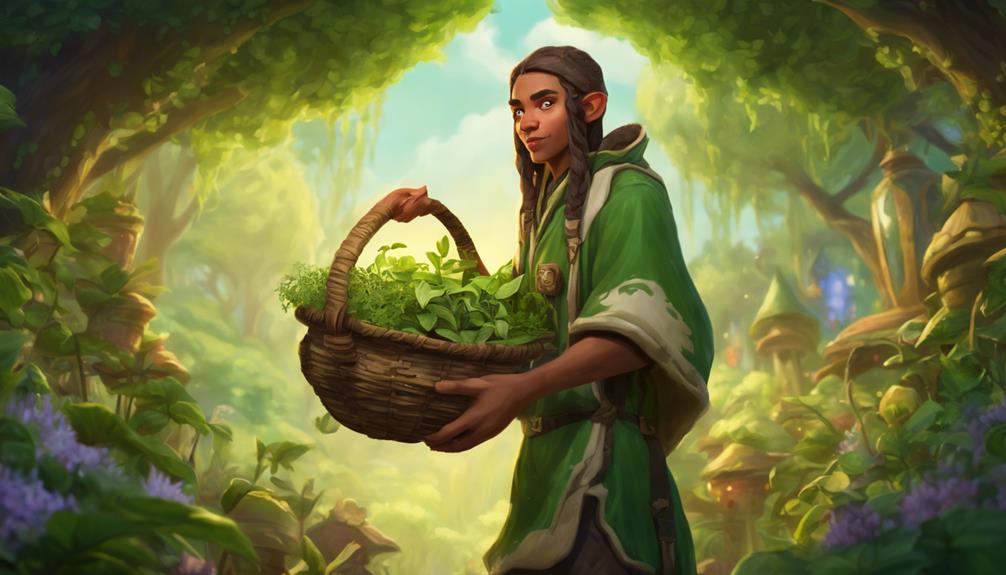
Now that we've found our trainers, it's time to get down to business and learn the basics of Herbalism.
We'll need to master the art of gathering herbs efficiently, so we can stockpile the resources we need to craft valuable potions and flasks.
As we start our journey, we'll focus on identifying the different herbs, preparing for harvest, and optimizing our gathering routes to maximize our yields.
Gathering Herbs Efficiently
As we venture into the world of herbalism, we'll want to master the art of gathering herbs efficiently to maximize our gains. To do so, we'll need to know where to look and how to optimize our gathering process.
Herbalism trainers in major cities can provide guidance on getting started, and they'll teach us how to use a herbalism tool to gather herbs from nodes in the game world.
When exploring the game world, we'll want to keep an eye out for nodes with green leaf icons on the minimap, indicating the presence of herbs. We'll also want to explore different zones and climates to find a variety of herbs, such as Mountain Silversage, Purple Lotus, and Golden Sansam, to level up our herbalism skill.
Additionally, we should stay aware of weather conditions, as rain or snow can affect herb availability. By following these tips, we'll be well on our way to gathering herbs efficiently and maximizing our gains in the world of WoW herbalism.
Herb Identification Guide
We'll need to familiarize ourselves with the different types of herbs we're gathering, so let's learn to identify the various species.
As we explore the vast lands of Azeroth, we'll come across diverse herbs, each with its unique characteristics. Some herbs, like Silverleaf and Peacebloom, are commonly found in starting areas like Mulgore, while others might be hidden in harder-to-reach zones, requiring a flying mount to access.
When searching for a particular herb, understanding that some only thrive in specific weather conditions is crucial, adding an extra layer of complexity to our gathering endeavors.
To make sure we're gathering the correct herbs, we can refer to our minimap, where herbalism nodes are marked with a green leaf icon. By clicking on these nodes, we can gather herbs and level up our herbalism skill.
As we progress, we'll discover more about the unique properties of each herb, allowing us to refine our gathering techniques and become more efficient herbalists.
Preparing for Harvest
To master the basics of herbalism, we must visit a trainer in major cities like Stormwind or Orgrimmar to learn the profession. Once we've learned the ropes, we'll need to obtain a herbalism tool to gather those precious herbs.
We can find these tools by clicking on the green leaf icons on our minimap, which will lead us to our first harvest. As we explore various zones in WoW Classic, we'll discover that each area has its unique set of herbs, so it's crucial to venture out and explore to gather a diverse range of herbs.
However, we'll soon realize that some herbalism nodes require a certain skill level to gather, so we'll need to keep leveling up our herbalism skill to access those coveted herbs. Additionally, completing herbalism quests can provide valuable rewards and materials to aid in leveling up the profession.
Gathering Herbs in Early Zones

We explore the world of herbalism by thoroughly searching the early zones for an abundance of valuable herbs that will help us advance our skills.
As we venture into the starting areas, we're on the lookout for Silverleaf and Peacebloom, which are abundant in Mulgore, Durotar, Tirisfal Glades, Elwynn Forest, and Teldrassil. These herbs are essential for progressing our herbalism skills, and we can't get enough of them!
As we progress, we'll find Mageroyal and Earthroot in zones like Westfall, Silverpine Forest, Loch Modan, and Darkshore. Briarthorn is another valuable herb we'll come across in The Barrens, Hillsbrad Foothills, Wetlands, and Stonetalon Mountains.
We'll also keep an eye out for Bruiseweed in Ashenvale, Stonetalon Mountains, and Hillsbrad Foothills. Finally, Wild Steelbloom can be found in locations like Stonetalon Peak, Arathi Highlands, and Hillsbrad Foothills.
Leveling Up in Outland Regions
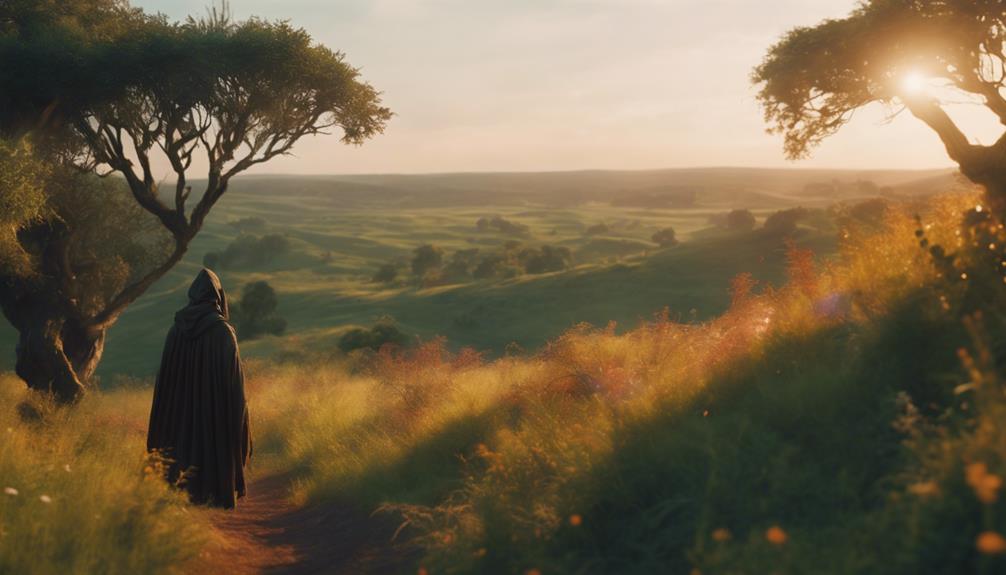
As we venture into the Outland regions, we're excited to explore the most efficient routes for gathering high-level herbs.
We'll navigate through the various zones, identifying the best spots to find rare herbs and optimize our leveling process.
Outland Herbalism Spots
Outland regions offer a wealth of herbalism opportunities, particularly in zones like Hellfire Peninsula, where abundant herb nodes await discovery between levels 300-315. As we venture further into Outland, we find that each zone provides a unique set of herbalism opportunities tailored to our skill level.
| Zone | Level Range | Herb Nodes |
|---|---|---|
| Hellfire Peninsula | 300-315 | Abundant herb nodes |
| Blades Edge Mountain, Nagrand | 315-325 | Herb nodes for leveling up |
| Terokkar Forest | 325-350 | Prime location for herb gathering |
| Netherstorm | 350-375 | Valuable herbs for leveling up |
We find that Blades Edge Mountain and Nagrand offer herb nodes for leveling up from 315 to 325, while Terokkar Forest is a prime location for gathering herbs between levels 325-350. Finally, for levels 350-375, we head to Netherstorm to find valuable herbs for leveling up our Herbalism skill. With such diverse opportunities, Outland regions provide a perfect environment for us to advance our Herbalism skills.
Best Routes for Herbs
To optimize our herbalism leveling in Outland, let's map out the most efficient routes for gathering valuable herbs in each region. We'll explore the best zones for leveling up our herbalism skills, making the most of our time and effort.
Here are the zones we'll focus on for each level range:
- 300-315: Hellfire Peninsula – a hotspot for herbalism leveling
- 315-325: Blades Edge Mountain and Nagrand – explore these areas for abundant herbs
- 325-350: Terokkar Forest – a treasure trove of herbs for leveling up
- 350-375: Netherstorm – the final stretch for maxing out our herbalism skills
To maximize our efficiency, we recommend utilizing addons or guides to optimize our routes and gathering strategies.
By following these routes and tips, we'll be well on our way to leveling up our herbalism skills in no time.
Remember to stay focused, and we'll reach our herbalism goals in Outland in no time!
Zones for Rare Herbs
We'll explore the Outland regions that hold the keys to finding those elusive rare herbs, essential for leveling up our herbalism skills in WoW Classic. As we venture into Hellfire Peninsula, we'll discover Dreaming Glory and Felweed, which will help us level up from 300 to 315.
Next, we'll head to Blades Edge Mountain and Nagrand, where we'll find Terocone and Fel Lotus, taking our skills from 315 to 325.
To reach herbalism skill level 350, we'll focus on gathering Ancient Lichen and Netherbloom in Terokkar Forest.
Finally, Netherstorm offers Nightmare Vine and Mana Thistle, helping us level up from 350 to 375.
Mastering Herbalism in Classic WoW

As we venture into the world of Classic WoW herbalism, we find that mastering this profession requires a strategic approach to gathering and utilizing the rarest and most valuable herbs. To maximize our herbalism skills, we need to focus on the most lucrative herbs, track the market demand, and join forces with other players to share resources.
Here are some key strategies to help us master herbalism in Classic WoW:
- Focus on valuable herbs: Identify the most sought-after herbs and prioritize gathering those to maximize our profits.
- Track the market: Keep an eye on the auction house and adjust our gathering strategy according to market demands.
- Join a guild: Collaborate with other players to share knowledge, resources, and expertise to optimize our herbalism skills.
- Explore extensively: Venture into different zones and areas to discover the rarest and most valuable herbs.
Advanced Herbalism Techniques

By refining our gathering strategy and adapting to market trends, we can now take our herbalism skills to the next level by employing advanced techniques to maximize our profits.
As we progress from levels 330 to 345, we focus on high-demand herbs like Dreamfoil and Mountain Silversage. Beyond level 350, we explore Zangarmarsh for Felweed, Ragveil, and Dreamfoil, taking advantage of the zone's herb diversity.
To optimize our gathering routes, we adapt to our server's population and utilize maps effectively. Understanding market demand is essential, so we monitor trends, selling strategically and diversifying our sales for maximum profitability.
Frequently Asked Questions
Where to Start Herbalism in Wow?
When we start herbalism in WoW, we head to major cities like Stormwind, Orgrimmar, or Ironforge to find a herbalism trainer. They'll teach us the basics.
Then, we explore starting zones like Mulgore, Durotar, or Elwynn Forest to gather herbs. We keep an eye out for green leaf icons on the minimap, marking herbalism nodes.
As we level up, we progress to higher-level zones, revealing new areas and herbs to discover.
Where Is the Best Place to Find Herbs in Wow?
As we venture into the vast world of Azeroth, we're on the hunt for the perfect spot to find those elusive herbs. We've scouted out the best zones, and our top picks include Mulgore, Westfall, and The Barrens, where a variety of herb nodes await.
For higher-level herbs, we head to Stonetalon Mountains, Arathi Highlands, and Tanaris, where the pickings are plentiful.
How to Get Herbalism Knowledge in Wow?
We're enthusiastic to learn herbalism in WoW, and the first step is to find a trainer.
We can visit major cities like Stormwind City, Orgrimmar, or Ironforge to locate a herbalism trainer. They'll teach us the profession and help us level up from Apprentice to Artisan.
One trainer can teach us all levels, so we don't need to search for multiple trainers. With their guidance, we'll be collecting herbs in no time!
How to Gather Herbs in Wow?
As we start our herbalism journey, we're excited to begin gathering those precious herbs.
To do so, we need to keep our eyes peeled for those green leaf icons on our minimap, indicating herbalism nodes.
A simple click on these nodes allows us to collect an array of herbs, such as Silverleaf, Peacebloom, and Briarthorn.
We'll find different herbs in specific zones and under varying weather conditions, so thorough exploration of the game world is crucial.
Conclusion
As we venture forth, our herbalism journey unfolds like a blooming wildflower, its roots digging deeper into the vast expanse of Azeroth.
From novice gatherers to master botanists, we've traversed the territories, unearthing secrets and techniques to cultivate our craft.
With each new discovery, our knowledge blossoms, and our passion for herbalism takes root, forever changing the landscape of our WoW experience.
Herbalism
Find Herbalism: Top 7 Resources
Crafting a holistic wellness journey just got easier with these 7 essential resources for mastering herbalism, but there's more to uncover.
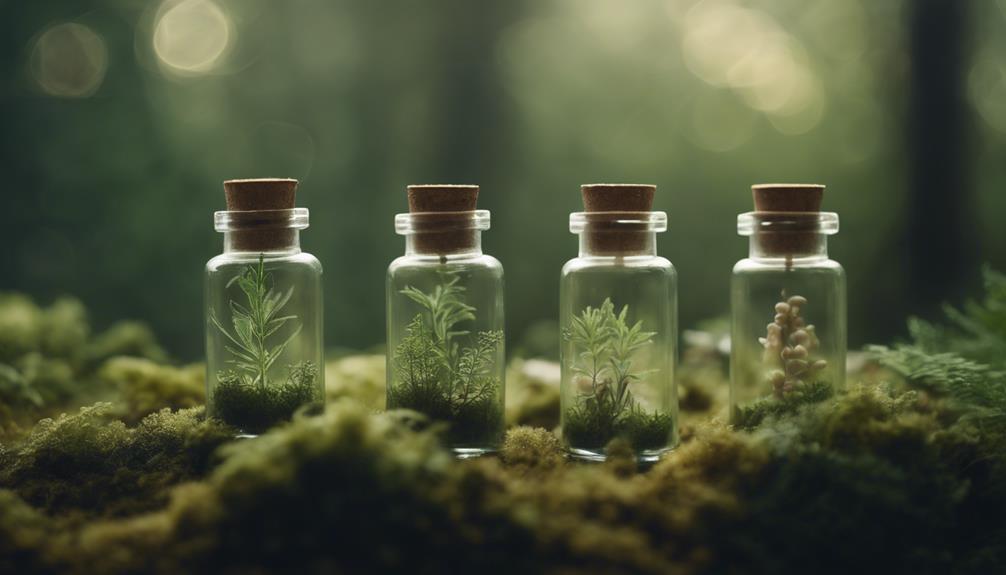
We've gathered the ultimate resources for mastering herbalism, from online platforms to expert-led courses and essential tools. Top online platforms like Herbal Academy and LearningHerbs.com offer extensive guides, while books like 'Herbal Antibiotics' and 'Prescription for Herbal Healing' provide in-depth knowledge. Expert-led courses, herbal communities, and forums facilitate learning and connection. Essential tools like high-quality herbs and mortars help us put knowledge into practice. By prioritizing holistic wellness and self-care, we can optimize our herbalism journey. As we explore these resources, we'll uncover a wealth of knowledge, and there's still more to discover as we venture further into the world of herbalism.
Key Takeaways
• Explore top online herbal platforms like Herbal Academy, LearningHerbs.com, and Mountain Rose Herbs for comprehensive resources and courses.
• Dive into expert-led online courses like Herbalism 101 Essentials and The Herbarium at Herbal Academy for structured learning.
• Join herbal communities and forums like Herbalist Q&A Sessions and Learningherbs.com to connect with experts and enthusiasts.
• Invest in essential herbalism tools and supplies like high-quality herbs, essential oils, and a mortar and pestle for hands-on practice.
• Prioritize holistic wellness and self-care by incorporating herbalism into daily routines and exploring wellness resources for mental and emotional balance.
Exploring Online Herbal Platforms
As we explore the world of herbalism, we're fortunate to have a wealth of online platforms at our fingertips, providing access to a vast array of resources, expertise, and knowledge. One such platform is the Herbal Academy, which offers formal herbal studies and courses for those interested in delving deeper into the world of herbalism.
Beyond the Herbal Academy, we've LearningHerbs.com, where we can tap into the expertise of renowned herbalists like 7Song and Rosemary Gladstar. Additionally, NutritionFacts.org, led by Dr. Michael Greger, provides science-based information on herbal medicines, further enriching our understanding of herbalism.
We're also grateful for EssentialHerbal.com, a community resource created by Tina Sams and Maryanne Schwartz, which serves as a hub for herbal enthusiasts. Lastly, Mountain Rose Herbs offers a free herbalism project with a resource library, providing yet another valuable online platform for our herbal journey.
These online platforms collectively provide a solid foundation for our exploration of herbalism, allowing us to access a wealth of knowledge and expertise at our convenience.
Best Books for Herbal Knowledge

We've curated a selection of the best books for herbal knowledge, each one offering a unique perspective on the world of herbalism.
For those interested in the medicinal properties of plants, 'Herbal Antibiotics' by Stephen Herrod Buhner is a must-read. This detailed guide explores the world of plant-based medicine, exploring the natural alternatives to conventional antibiotics.
Another valuable resource is 'Prescription for Herbal Healing' by Phyllis Balch, an A to Z reference guide that covers a wide range of herbal remedies.
If you're interested in cultivating your own herbs, 'Pawpaws: The Complete Guide to Growing and Marketing' is an excellent resource, offering insights into plant cultivation and marketing.
Online, the Permies.com site basics thread provides a wealth of information on herbal medicine and sustainable living practices.
While we didn't include online courses in this section, the 'Golden Goat Herbals Herbalism and Fermented Sodas Video Course' is worth mentioning, providing a thorough introduction to herbal tea blends and fermentation techniques.
These resources will provide a solid foundation for anyone looking to deepen their understanding of herbalism.
Expert-Led Herbal Courses Online

As we explore the world of herbalism, we're seeking expert guidance to guarantee we're receiving accurate information. That's why we're excited to explore the wealth of expert-led herbal courses online, which offer us a chance to learn from experienced practitioners and establish a solid foundation in herbalism.
With courses like Herbalism 101 Essentials, we can engage in interactive online learning that sets us up for success in our herbal journey.
Herbalism 101 Essentials
Through expert-led online courses, we can explore the world of herbalism in depth, investigating topics like plant identification, herbal preparations, and holistic wellness with structured learning modules and supportive communities.
These courses offer a solid foundation for those interested in herbalism, covering the essentials of herbal medicine. At Herbal Academy, we've access to a wealth of information on herbalism, including a detailed resource library, The Herbarium, which provides in-depth information on herbs, plants, and their medicinal properties.
The Academy Blog also offers free articles and resources, further enriching our understanding of herbalism. With expert-led online courses, we can immerse ourselves in the world of herbalism, gaining a deeper understanding of the principles and practices of herbal medicine.
Learn From Experienced Practitioners
We explore the world of herbalism by enrolling in expert-led online courses, where experienced practitioners like Rosemary Gladstar and 7Song share their knowledge and expertise. These courses provide us with a structured learning experience, allowing us to delve deeper into the world of herbalism.
At the Herbal Academy in Massachusetts, we can find courses that offer optional exams to test and solidify our knowledge in herbal medicine. We can also learn from experienced practitioners through online platforms like Learningherbs.com, where we can gain valuable insights from renowned herbalists. Additionally, Certified Garden Master courses offer live streams and interactions with experienced herbal practitioners, further enhancing our learning experience.
Some online courses, like those by Kate Downham, focus on unique aspects of herbalism, such as personal-scale cheese making. By learning from experienced practitioners, we can gain a more comprehensive understanding of herbalism and its applications. With Rose Herbs being a popular online resource, we've access to a wealth of knowledge at our fingertips.
Interactive Online Learning
By participating in expert-led herbal courses online, we immerse ourselves in interactive online learning experiences that cultivate deeper connections with instructors and like-minded individuals.
We can explore in-depth educational platforms like Herbal Academy in Massachusetts, which offers structured curricula and optional exams to test our knowledge. Alternatively, we can engage in real-time learning with Certified Garden Master courses, featuring live streams that allow us to interact with instructors and fellow students.
Online courses by Kate Downham take a hands-on approach, focusing on personal-scale cheese making, while Learningherbs.com provides a wide range of classes on herbalism.
Additionally, courses like The Healing Properties of Mushrooms offer interactive online learning, delving into the medicinal benefits of mushrooms.
Through these online resources, we can engage in interactive online learning, gaining valuable insights and skills in the comfort of our own homes. By leveraging these expert-led courses, we can expand our knowledge and connect with others who share our passion for herbalism.
Herbal Communities and Forums

As we explore the world of herbalism, we're not alone – there are many online communities and forums where we can connect with fellow enthusiasts and experts. From herbalist Q&A sessions to online forums, these platforms offer valuable opportunities to ask questions, share knowledge, and learn from one another.
Herbalist Q&A Sessions
In addition to participating in Herbalist Q&A sessions through online herbal communities and forums, we regularly engage with seasoned practitioners to tap into their collective knowledge and experience. These sessions provide us with a unique opportunity to ask questions, clarify doubts, and gain valuable insights from experienced herbalists.
By taking part in Herbalist Q&A sessions, we can explore different perspectives and approaches to herbalism, receive personalized advice and recommendations for herbal remedies and practices, and stay updated on the latest trends, research, and information in the world of herbalism.
Furthermore, these sessions allow us to connect with a community of like-minded individuals who share our passion for herbalism. We can actively engage in discussions, share our own experiences, and learn from others in a supportive and collaborative environment.
Online Herbal Forums
We turn to online herbal forums, such as Learningherbs.com and Nutritional-Solutions.net, to tap into the collective knowledge of experienced herbalists and like-minded individuals. These herbal forums provide a platform for us to connect with others who share our passion for herbalism, allowing us to learn from each other's experiences and gain valuable insights.
For instance, the forum on NutritionFacts.org covers a wide range of topics related to herbal remedies, providing evidence-based information for those interested in herbal medicine. Similarly, The Essential Herbal community is a well-regarded resource for herbalists looking to connect with like-minded individuals, share tips, and expand their knowledge in the field of herbalism.
Essential Herbalism Tools and Supplies
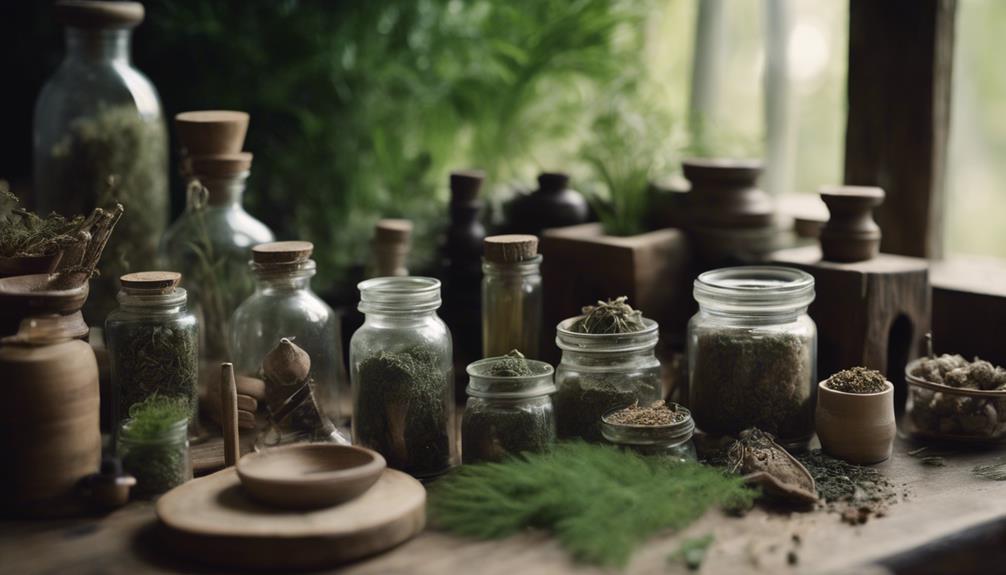
When it comes to building a solid foundation in herbalism, having the right tools and supplies is essential, and Mountain Rose Herbs is a trusted source for high-quality herbs, essential oils, and herbal supplies. We've found that investing in the right equipment can make all the difference in our herbalism journey.
Here are some essential herbalism tools and supplies we recommend:
| Tool/Supply | Description |
|---|---|
| High-quality herbs | Fresh, organic herbs for teas, tinctures, and salves |
| Essential oils | Pure, unadulterated oils for aromatherapy and skincare |
| Mortar and pestle | For grinding and mixing herbs and spices |
| Herbalism books | Detailed guides to herbalism, like Tamed Wild's Wild Medicine Deck |
Holistic Wellness and Self-Care

In addition to exploring the world of herbalism, we're reminded that nurturing our overall well-being is just as important as crafting the perfect herbal remedy.
Holistic wellness isn't just about physical health, but also mental and emotional balance. This winter, we can prioritize our well-being by staying hydrated, getting enough sleep, and incorporating immune-boosting herbs into our routine. By setting achievable goals and prioritizing mental health, we can improve our overall health by year-end.
Additionally, we can explore various wellness resources, such as online courses, books, and community groups focused on holistic health and self-care practices. Sharing and discovering wellness tips within communities can provide valuable insights, support, and inspiration for incorporating herbalism and self-care into our daily lives.
Advanced Herbal Education Institutes

Through advanced herbal education institutes, we're immersing ourselves in our herbalism skills to the next level, delving into specialized courses and programs that refine our knowledge and techniques.
In Massachusetts, the Herbal Academy offers structured courses with optional exams for advanced herbal education. For those seeking interactive learning, Certified Garden Master courses provide live streams, offering in-depth knowledge.
If culinary herbalism is our focus, Kate Downham's online courses on personal-scale cheese making enhance our skills. At Learningherbs.com, we find a range of classes catering to different levels of expertise.
For a deeper exploration into advanced herbal medicine, The Healing Properties of Mushrooms course explores the medicinal benefits of mushrooms. These institutes provide a wealth of knowledge, allowing us to expand our understanding of herbalism.
Frequently Asked Questions
Where Is the Best Place to Study Herbalism?
When we're looking to study herbalism, we're often wondering where to start. We might ask ourselves, 'Where is the best place to study herbalism?'
The answer isn't one-size-fits-all, as it depends on our learning style and goals. We might prefer structured courses like those offered by The Herbal Academy, or online classes with a more personalized approach, like Kate Downham's courses.
Whatever our choice, we're taking the first step towards a deeper understanding of herbalism.
Can You Be a Self-Taught Herbalist?
We can definitely be self-taught herbalists. Many successful herbalists have learned through self-study, using resources like books, online courses, and community forums.
We can start by building a solid foundation with basic herbalism books and online courses from reputable sources. Then, we can gain practical experience by growing and working with herbs, experimenting with remedies, and seeking guidance from experienced herbalists.
What Is the Difference Between a Herbalist and a Herbologist?
We often get asked about the difference between a herbalist and a herbologist. Simply put, a herbalist focuses on using herbs for medicinal and therapeutic benefits, often working directly with clients to provide personalized remedies.
On the other hand, a herbologist studies plants for various purposes, including medicinal properties, and may conduct research or teach.
While both roles promote the use of plants for health and well-being, herbalists focus on practical applications, whereas herbologists focus on scientific study and research.
How Long Does It Take to Become a Herbalist?
We're often curious about the time it takes to become a herbalist. Let's investigate this theory!
The answer varies greatly, ranging from a few months to 4 years, depending on the level of education and training pursued.
Short programs can provide basic knowledge in weeks or months, while formal certification programs take around 1-2 years, and advanced training can take up to 4 years.
Conclusion
As we conclude our journey to find herbalism, we're reminded that 80% of the world's population relies on traditional medicine, with herbalism being a significant part of it.
With the resources we've gathered, we're empowered to take control of our health and wellness.
From online platforms to expert-led courses, and from books to essential tools, we've got the knowledge and support to navigate the world of herbalism.
-

 Herbalism2 months ago
Herbalism2 months agoDoes Herbalism Actually Work?
-

 Anti Aging2 months ago
Anti Aging2 months agoMost Effective Anti-Aging Drink: 5 Top Picks
-

 Bone Health2 months ago
Bone Health2 months agoHerbal Secrets Unleashed: Boost Bone Density
-

 Anti Aging2 months ago
Anti Aging2 months agoWhich Tea Increases Lifespan?
-
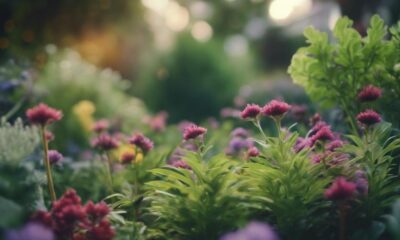
 Anti Aging2 months ago
Anti Aging2 months agoThe Immortal Herb: Unveiling Its Special Qualities
-

 Anti Aging1 month ago
Anti Aging1 month agoAstragalus: The Ultimate Anti-Aging Herb
-
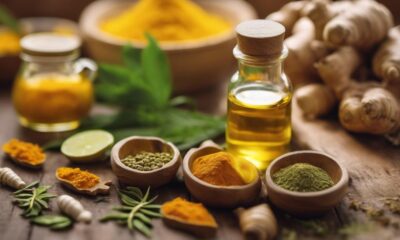
 Inflammation Management2 months ago
Inflammation Management2 months agoBest Natural Medicines for Joint Inflammation Relief
-
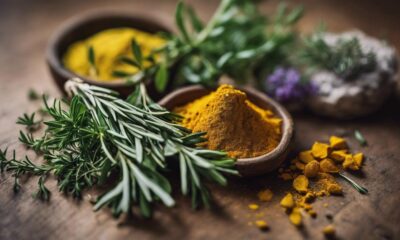
 Mental Health2 months ago
Mental Health2 months agoBest Herbs for Boosting Brain Health


















